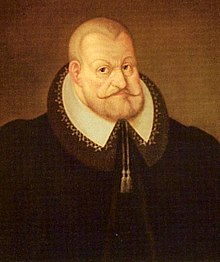Julius of Brunswick-Wolfenbüttel
| Julius | |
|---|---|
| Duke of Brunswick-Lüneburg | |

Contemporary portrait
|
|
| Prince of Brunswick-Wolfenbüttel | |
| Reign | 1568–1589 |
| Born |
29 June 1528 Wolfenbüttel, Duchy of Brunswick-Lüneburg |
| Died | 3 May 1589 (aged 60) Wolfenbüttel |
| Noble family | House of Welf |
| Spouse(s) | Hedwig of Brandenburg |
|
Issue
Sophie Hedwig
Henry Julius Maria Elisabeth Philip Siegmund Joachim Charles Dorothea Augusta Julius Augustus Hedwig |
|
| Father | Henry V, Duke of Brunswick-Lüneburg |
| Mother | Maria of Württemberg |
Julius of Brunswick-Lüneburg (also known as Julius of Braunschweig; 29 June 1528 – 3 May 1589), a member of the House of Welf, was Duke of Brunswick-Lüneburg and ruling Prince of Brunswick-Wolfenbüttel from 1568 until his death. From 1584, he also ruled over the Principality of Calenberg. By embracing the Protestant Reformation, establishing the University of Helmstedt, and introducing a series of administrative reforms, Julius was one of the most important Brunswick dukes in the early modern era.
Born at the princely court in Wolfenbüttel, Julius was the youngest surviving son of the warlike Duke Henry V of Brunswick-Lüneburg (1489–1568) and his consort Maria (1496–1541), daughter of the Swabian count Henry of Württemberg. His father, a devout Catholic, had significantly enlarged the territories of his Principality of Wolfenbüttel in the Hildesheim Diocesan Feud, but soonafter entered a fierce conflict with the Schmalkaldic League which brought him close to the loss of his principality, until the Protestant forces were finally defeated in the 1547 Battle of Mühlberg.
As a younger son, Julius was expected to pursue a clerical career. He studied at the universities of Cologne and Leuven. He set out on a Grand Tour through France in 1550 and began to build up a personal collection of books, the basis of the later Herzog August Library in Wolfenbüttel. At the insitgation of his father, Julius was appointed Princ-Bishop of Minden, by the cathedral chapter on 23 April 1553, succeeding Franz von Waldeck. He never received papal confirmation, however, and resigned after only a year.
...
Wikipedia
